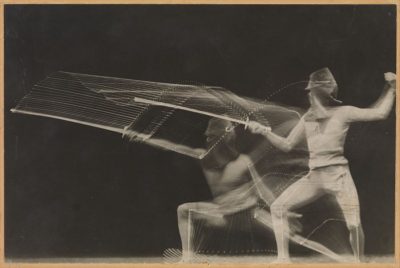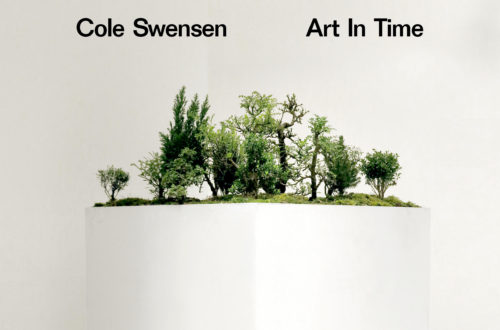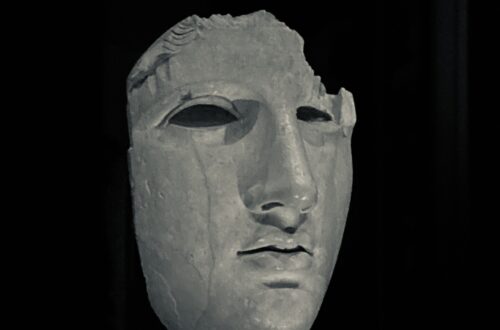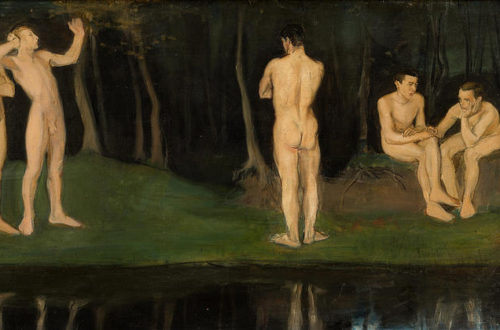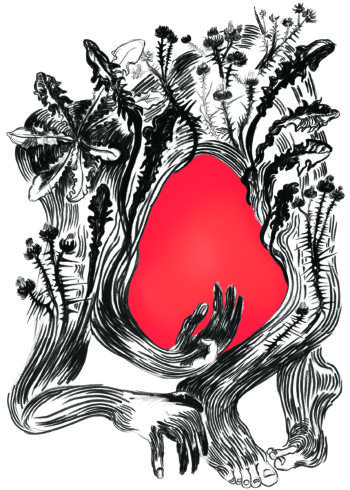
"Regnum" A short story by Bronka Nowicka (translated from the Polish by Katarzyna Szuster) Artwork by Lula Bajek
Regnum
Mad Mary, Ursula, insane Nina, haunted Agnes, guide me. Let me stick my hands in the pockets of your housecoats, where the keys are nestled in the bundles of your handkerchiefs. Let me steal them and set the door to the kingdom ajar.
At night Nina kneads bread and weeps into it. In the kitchen, the milk gives off light until she pours it into dun flour and then it goes out. The woman kneads the dough in the dark. The table squeaks, pushed by her belly. Babies used to rise in it like sourdough but then they snuck out prematurely. They died undercooked. After the third son was half-baked, Nina put out the fire in her belly. She turned bitter, a flavor her husband didn’t enjoy. Every time he tried her, he tasted wormwood.
Now she has wholemeal clay, which she can bake into anything but people. The dough swells up under her churning hands. Her finger gets snagged on a bowl’s steel gnarl. A shard of enamel digs under her fingernail. The blood seeps into the dough.
“I’ll be in the bread,” says Nina, pleased.
At dawn, she sticks warm chunks of bread in the soil.
“Hope you like it,” she tells her boys who were hiding in there.
In the morning, she inhales the cigarette smoke getting ready for life-duty, the sort where one suffers injuries at home. She’s smoking in the doorway with her back to the hallway and the garden in front of her. She looks with her eyes at the sun, and with the back of her head at her mother. When Nina looks with her skin, her flesh creeps. She feels a tingle on her back, where the hag is lurking. A gust sweeps through the trees, you can hear the leaves. The mother, lined with felt, doesn’t rustle when reaching for a gun. She reloads her gaze and aims at her daughter’s back. If she aims well, the bullet will go right through.
“Why do you even have a baby bag if you can’t carry to term?” the mother hisses.
It’s bright before Nina. The sun and the cigarette are lined up. Two dots glow across from each other. If the tobacco goes out, the woman will lean forward and light it up straight from the star. It’s dark behind Nina. The mother’s eyes sent two bullets – they only get sharper cutting through the hallway. Standing between the dark and the light, Nina grasps with her whole body what they are. Two sides of the same painting.
One night, she hears something mumbling inside her. A voice moves under her skin. Someone’s knocking on her heart.
“What do you want?”
“Open up,” her blood asks, “Someone’s locked me up here. I’ve been going in circles in complete darkness. I can’t even see my color.”
“Why do you want out?”
“I need to make sense of my own course. Find the source.”
“If I let you out, you’ll run away.”
“I will return,” the blood promises.
In the morning, Nina takes her husband’s razor. She goes to the edge, where the streets end and the fields begin.
*
The door rattles and skinny Agnes, the tramway saint of words, squeezes between the masses like a bony needle.
“Get your words ready,” she yells limping down the car. The passengers confuse their pockets with their mouths and rummage through the wrong holes.
“Let me see your words,” the immaculate cripple demands.
Only the dumb are forgiven for the free ride. She places her hand like a tray under people’s chins and pats them on the back with the other hand until they utter something. She shoves each sentence into her beggar’s purse hanging by her ribs. With her finger, she pushes curses into side pockets, stuffs sour complaints and jams down bitter sorrows. The tram rings, the door slides apart and Agnes steps off with a bag full of speech. She limps towards the church, where women carry flowers for a May devotion. She’s there for an oration.
Sunday-goers pour out into the courtyard while the saint is standing by the wall, preaching:
“What do you eat, people?” she rumbles, shaking her purse with words. “What do you put on your bread?”
Someone laughs under their breath and quickens their pace. A few people exchange looks. A boy makes two circles with his finger by his temple.
“Speech is alimentary, you gluttons,” Agnes cries out. “A word passes through your mouth where you eat. It has content: it can strengthen you like sugar or burn like pepper. It can poison or nourish you. It either sates or starves you. Eating this,” she points to the sentences collected on the tram, “you’ll die.”
Suddenly – a blow. For a moment, someone’s fist departs from the swarm and then returns to its kind. Agnes is down. She throws her arms on her busted head. She can see the words pouring out of her purse and rolling under the soles of her shoe. Trampled, they bleed yellow.
*
A thought is an acrobatics, which Mary can’t do. Her tongue is too sluggish to extract material for sense. She was born that way.
Her father was the first to figure it out and started tampering with her. He took her to his workshop for a check-up. He sweat a lot because his hands were big and his daughter’s parts small. He couldn’t find an obvious defect with her. When it was over, he put the dismantled child together and smacked her on the head. He thought that this was where something had gone loose. When he smacked the radio, it played again. Mary didn’t work that way, she was permanently broken. Unlike her mother, who never broke down, tilled the land and gave milk. She only unharnessed herself for feedings. She made sure all three of them chewed at the same time.
“This keeps a family together,” she said, pointing to meat and potatoes. Next, she displayed the mechanics of her jaws. She taught her family how to turn food into life content. Now they’re at the table again. Mother serves sticky rice. Mary’s barely eating. She doesn’t want her father to stick to her. Between bites, her mouth is open. It holds silence.
“Mary, how much is one?” father asks.
The sun is one. One is a person, alone under their skin. In response, the girl points to the yellow disc or herself. She also knows what two is: a sparrow’s wings, a pair of shoes or eyes. Human hands – a measure of twoness hanging by one’s side – everything that they grab at the same time means two. Two has its own weight and is capturable. Where two ends, many begins. Way too many: fingers, years, too much hair. Mary can’t say how many she has of that.
She’s afraid when she sees more than two hands by her. She grows extra ones when she’s alone with her father. They creep out on her thighs, breasts and neck. Women must be the most fertile there. The hands sprout, Mary is fruitful for her dad. She’d like to pull them out but she can’t. She grows over with weeds like a wild garden, increasingly erratic.
*
On the outskirts, Nina cuts her veins while men are cutting the grass. On one side of the meadow, stems lean to the ground; on the other, blood leans out of her wrist.
“Run, you don’t have much time,” Nina hurries it up. “If you don’t come back in time, I’ll start worrying.”
The pulse is ticking. The blood reels by the body, sniffs around looking for a way. When it catches the scent, it dives into the field. A reaper lifts his head up, moves the blade away from the stems. He listens in silence. After a while, he catches the sound coming from the ground.
“Look, a red animal,” he tells the others.
They can see and hear: crimson throbs in the green. The blood is running, cutting through the patches. It heads to where the horizon reveals itself.
“Hurry up,” Nina whispers, left behind. “I’m getting cold.”
The blood stops by the horizon. It jostles its line, its head bumps the sheet of the sky and it disappears behind the curtain.
There is a cemetery nearby. Two scrooges are looking at a funeral procession. Their enraged walking sticks are pecking at the pavement: loitering underfoot, they feed on grains of sand.
“They should finally do away with this fashion for dying. Who said everyone has to do it, even children?”
“Not everyone can afford it without making sacrifices.”
“Some have saved up all their lives for that moment and there’s no knowing if it will pay off.”
When the casket disappears, they fix each other’s hair: each takes out a comb and introduces order to the other one’s part. The gust of infinity has messed up their hair.
*
“I want to breed,” says the body.
“It’s too late,” Ursula explains to it.
In return, it beats her. It does so until it gets tired. When it’s tired, it looks old.
“Can I still give birth, doctor?”
“Your architecture no longer permits it.”
“Can you see anything disturbing?”
“Structural deficit in line with your age.”
“I feel fine.”
“Your anatomical narration says something else.”
“I’m robust.”
“Then you’ll turn into a live granary for bones.”
“I’m aware of the risk but I’m willing to try.”
“Best case scenario, you’ll bear a nomadic doll or a beast.”
“I’m prepared to give birth even to a dog.”
“If you whelp, some of your litter may have no paws.”
“What about a doll? An ordinary doll that grows inside.”
“You can’t forge the organic parts.”
“A tree then?”
“Even for that you’re short of fertilizer.”
“Is there anything at all I could carry?”
“You won’t even carry a box of matches.”
“And a poem?”
“That you can try.”
Windows open in a tenement house, and mouths – in people leaning out of them. They spill out a cackle. The sneering hits the windowsills before it falls onto the courtyard, where Ursula is writhing in labor pains. Pressed against the wall, she holds on to her pregnancy made of rags – a sack tied to her back with a couple of straps. A baby made of paper and ink is starting to insert its head of crumpled pages.
“Boil the water,” the women chuckle.
Ursula spreads her legs and squats down. She sucks in air and exhales it with a scream that startles the pigeons. The sack starts to tear, the canvas rips open.
“Push,” a man above laughs.
“Push,” bystanders echo.
A little head, a wrinkled paperette flickers in the slit of the canvas. Ursula breaks the umbilical cord and embraces the printed effigy. She reads out the first-born poem off its forehead.
*
People contain their interior monologues inside their bodies. If these sound-absorbing barriers were taken down, the rumble would spill out. A wave of noisy thoughts would rip up the world. Nothing speaks inside Mary. If opened up, she’d only make a fizzle. The girl has a silent movie inside her. She likes to screen a film featuring a bitch. She keeps recalling the animal killing off fleas in the yard: lying down, she drilled her back into the ground. A metal door creaked, the father was coming. The bitch jumped up with a twist of her trunk and scurried, having shaken off the specks from her back. She swayed from side to side until she sank into the horizon.
Now, when the bitch is again rolling inside Mary, she goes out on the road in front of the house. She lies down in the dirt and rubs herself against the pavers. She wants both of her father’s hands to crumble away. She grinds down the foreign fingers against the stones. Later, she brushes herself off and follows the bitch. She leaves the scraps of the hands behind. Chasing her own vision, she picks up speed. The passersby stop, turn their heads behind Mary. And she twirls spreading her arms out. Running outside the city – free of the hands – she dances.
Agnes, the bruised up saint of words, leans over the table. Before she wraps love in wax paper, she removes its treacherous end. She grinds the lo in her mouth to reach the ve with her tongue. With two fingers, she picks the needle out of the word. The rest, now safe, she spells into her palm. Then she transfers it into a strip of tissue. She wraps it like a piece of candy. The word, ready to go, is placed in her purse with similar wrappers. Later, she loiters around houses. She stands on her toes to reach the windows. In their nooks, she puts the sweet victuals. She drops them off by the door like milkmen used to do. She hangs them on a thread from the handles of front gates. In the end – weary – she unwraps a handful of words, crushes them into syllables and feeds them to the birds in the market square.
“Eat up and fly away,” she murmurs. Then she trudges ahead.
The rain is only passing through the town, an impatient glazier. He arrives, lays out mirrors on the ground and moves on. The sky can see its reflection only for a short while because they evaporate. Nina easily skips around puddles on her way to the store. It’s much harder to skip vipers. Someone constantly throws snakes under her feet. The woman moves them aside with the tip of her umbrella.
“She’s suicidal,” people hiss. “Sssuicidal.”
In the store, the hags are writhing. They gossip as they zig-zag to the cash register. They have something on their tongues. They twaddle about the one who cut her veins open. There are adders in their twaddle. Nina stands in line. The milk in her basket goes sour from the venom. The eyes of the shoppers are hard. Whatever they look at turns into stone that weighs down her bandaged wrists. The hags are thinking: death is contagious, you can catch it by being touched, so they all move away from Nina. She smiles.
“My blood went beyond the curtain,” she says. “Before it returned, it had seen the source.”
In the courtyard, Ursula reads her first-born poem while onlookers lean out the windows, engrossed. Each newborn is out of this world. It migrates into this reality from a different order. Having crossed the border, it still carries its traces. The poem hovers, elevated by the echo of the tenement’s well. The tenants reach out their hands beyond the sills. Everyone wants to hold the newborn for a moment. To grab a handful of lyricism.
The woman stops talking. She takes her baby and walks towards the gate. Windows are closing with a slam – people are going back to their business. Before they resume their daily performance, they stand, thrown off their act. They look at the props to their lives: water is dripping from faucets, a cat is stretching, potatoes are gurgling on the stove. Everything is a little off, though. Even a fly landing on a bread slice does so somewhat differently. Someone sits in a chair and closes their eyes. Another person is humming. Keys are swaying in the lock of a door that has just been shut. Someone sees them as a prophecy of another door, which – when open – leads to a kingdom.
*** *** ***
Regnum
Szalona Mario, Urszulo, pomylona Nino, nawiedzona Agnieszko, prowadźcie mnie. Pozwólcie mi wsadzać ręce w kiszenie waszych podomek, gdzie w zawiniątkach z chustek śpią klucze. Dajcie je kraść, uchylać drzwi do królestwa.
Nocą Nina zagniata chleb, w który płacze. W kuchni przyświeca jej mleko, póki wlane do burej mąki nie zgaśnie. Wtedy kobieta po ciemku wyrabia masę. Skrzypi stół popychany przez brzuch. Kiedyś jak na drożdżach rosły w nim dzieci, ale wymykały się stamtąd przed czasem. Umierały niedopieczone. Po trzecim synu z zakalcem Nina przestała palić w brzuchu. Zrobiła się gorzka i już nie smakowała mężowi. Kiedy jej próbował, spluwał piołunem.
Teraz ma razową glinę, z której udaje się wypiec wszystko oprócz ludzi. Ciasto puchnie pod dłońmi pracującymi w miednicy. Palec zahacza o stalowy sęk. Odprysk emalii wbija się pod paznokieć. Krew przesiąka w zaczyn.
– Będę w chlebie – cieszy się Nina.
O świcie wsadza ciepłe pajdy w ziemię.
– Smacznego – mówi swoim chłopcom, którzy się tam schowali.
Rano zaciąga się papierosem do życia – na służbę, podczas której rany odnosi się w domu. Paląc w progu, ma za sobą korytarz, z przodu ogród. Oczami wpatruje się w słońce, tyłem głowy widzi swoją matkę. Gdy Nina patrzy skórą, cierpnie. Czuje mrowienie na plecach, za którymi czai się stara. Przez drzewa przechodzi podmuch, słychać liście. Matka podbita filcem nie szeleści, sięgając po broń. Przeładowuje wzrok, mierzy córce w krzyż. Jeśli spojrzy celnie, pocisk przejdzie na wylot.
– Po co ci torba na dzieci, skoro nie umiesz donosić? – syknie matka.
Przed Niną jest jasno. Słońce i papieros tkwią na jednej linii. Dwa kółka żarzą się naprzeciw siebie. Jeśli tytoń zgaśnie, kobieta wychyli się w przód i odpali go wprost od gwiazdy. Za Niną jest mrok. Oczy matki wysłały dwie kule – ostrzą się, tnąc przez sień. Stojąc między ciemnością a światłem, Nina całą sobą pojmuje, czym są. Dwiema stronami tego samego obrazu.
Pewnej nocy słyszy, jak coś w niej mamrocze. Czyjś głos przemieszcza się pod skórą. Od strony serca ktoś się dobija.
– Czego chcesz?
– Otwórz mi – prosi krew. – Ktoś mnie tu zamknął. Chodzę w tobie w kółko w zupełnej ciemności. Nie widzę nawet swojego koloru. Dla siebie samej jestem czarna.
– Po co chcesz wyjść?
– Muszę nadać sens własnemu biegowi. Znaleźć źródło.
– Gdy cię wypuszczę, uciekniesz.
– Wrócę – obiecuje krew.
– Rano Nina bierze brzytwę męża. Idzie tam, gdzie kończą się ulice i zaczynają pola.
*
Klekoczą drzwi i jak kościana igła wciska się w tłuszczę chuda Agnieszka, tramwajowa święta od języka w gębie.
– Szykować słowa – krzyczy, kulejąc przez wagon. Pasażerowie mylą usta z kieszeniami, przeszukują nie te czeluści co trzeba.
– Okazać słowa – każe niepokalana kaleka.
Tylko niemym odpuszcza przejażdżkę na gapę. Podstawia ludziom pod brody tackę jednej dłoni, drugą klepie ich w plecy, by coś wykrztusili. Każde zdanie wsadza w żebraczą torbę pod żebrami. Palcem upycha przekleństwa w przegrody, pakuje w nie kwaśne skargi, wciska gorzkie żale. Tramwaj dzwoni, rozchodzą się drzwi i w miasto zstępuje Agnieszka z workiem pełnym mowy. Kuśtyka w stronę kościoła, gdzie kobiety z kwiatami idą na majowe. Ona na wymowne.
Niedzielnicy wchodzą na dziedziniec, a pod murem stoi święta i głosi kazanie.
– Co wy zjadacie, ludzie? – grzmi, potrząsając torbą ze słowami. – Co jecie do chleba?
Ktoś śmieje się pod nosem i przyspiesza kroku. Kilka osób wymienia spojrzenia. Chłopak kreśli palcem dwa kółka przy skroni.
– Mowa jest pokarmowa, głodomory – woła Agnieszka. – Wyraz przechodzi przez usta, gdzie się je. Zawiera treść: może krzepić jak cukier lub palić jak pieprz. Truje bądź odżywia. Syci albo głodzi. Jedząc to – pokazuje zdania zebrane w tramwaju – pomrzecie.
Nagle – uderzenie. Czyjaś pięść opuszcza chmarę, po czym wraca do swoich. Agnieszka leży. Zarzuca ręce na pękniętą głowę. Widzi, jak słowa wysypują się z torby i toczą pod podeszwy. Deptane, oddają żółć.
*
Myśl to akrobacja, jakiej Maria nie zrobi. Jej język jest zbyt ociężały, by dał się zatrudnić do wydobycia surowca na sens. Taka się urodziła.
Ojciec odgadł to pierwszy i zaczął przy niej majstrować. Brał ją do warsztatu i przeglądał. Pocił się przy tym, bo jego ręce były duże, a części córki małe. Nie znajdował w nich widocznej wady. Po wszystkim składał rozebrane dziecko i bił w głowę. Sądził, że właśnie tam coś się obluzowało. Gdy uderzał radio, zaczynało grać. Maria tak nie działała, była zepsuta na stałe. Inaczej niż jej matka, która nie psuła się nigdy: ciągnęła dom i dawała mleko. Wyprzęgała się tylko w porach przeżuwania. Dbała, żeby wszyscy troje żuli w jednym czasie.
– Tym się scala ludzi – mówiła, pokazując mięso i ziemniaki. Później dawała popis pra- cy szczęk. Uczyła rodzinę, jak przerabiać jedzenie na treść życia. Teraz też siedzą przy stole. Matka stawia na nim kleisty ryż. Maria prawie nie je. Nie chce, żeby ojciec się z nią zlepił. W przerwach między kęsami ma otwartą buzię. Widać w niej milczenie.
– Ile to jeden, Maria? – pyta ojciec.
Słońce to jeden. Jeden to człowiek, sam pod własną skórą. W odpowiedzi dziewczyna pokazuje żółtą tarczę lub siebie. Wie jeszcze, czym jest dwa: skrzydła wróbla, para butów, oczy. Ludzkie ręce – wisząca po bokach miara podwójności – wszystko, co wezmą obie w jednym czasie, znaczy dwa. Dwa posiada swój ciężar, daje się uchwycić. Za dwoma od razu zaczyna się wiele. O wiele za dużo: palców, włosów, lat. Maria nie umie stwierdzić, ile tego ma.
Boi się, gdy widzi u siebie więcej niż dwie dłonie. Te dodatkowe rosną, gdy zostaje z ojcem. Wyłażą jej na udach, piersiach, szyi. Pewnie tam kobiety są najbardziej żyzne. Łapy się plenią, Maria jest urodzajna dla taty. Chciałaby je wyrwać, ale nie potrafi. Porasta chwastami niczym zdziczały ogród. Coraz bardziej nieobliczalna.
*
Za miastem Nina tnie żyły, a mężczyźni trawę. Po jednej stronie łąki chylą się łodygi, po drugiej z nadgarstka wychyla się krew.
– Leć, masz mało czasu – ponagla ją Nina. – Jeśli nie wrócisz w porę, zacznę się martwić.
Puls tyka. Krew kręci się przy ciele, węsząc, szuka drogi. Gdy znajduje trop, daje susa w łan. Kosiarz unosi głowę, odsuwa ostrze od źdźbeł. Nasłuchuje w ciszy. Po chwili chwyta dźwięk idący od ziemi.
– Patrzcie, czerwone zwierzę – mówi do pozostałych.
Tamci widzą i słyszą: w zieleni tętni purpura. Krew biegnie, przecina zagony. Zmierza w miejsce, gdzie się odsłania horyzont.
– Szybciej – szepcze zostawiona Nina. – Stygnę.
Krew zatrzymuje się przed horyzontem. Trąca jego linię. Podbija łbem płachtę nieba i znika za kurtyną.
Nieopodal jest cmentarz. Dwie sknery patrzą na kondukt. Ich wściekłe laski dzióbią bruk: kręcą się pod nogami, jedząc ziarna piasku.
– Powinno się wreszcie skończyć z tą modą na umieranie. Kto powiedział, że każdy musi to mieć, nawet dzieci.
– W końcu nie wszystkich na to stać bez wyrzeczeń.
– Niejeden całe życie odkłada na tę chwilę i wcale nie wiadomo, czy mu się opłaci.
Trumna znika, a one czeszą się na krzyż: każda wyjmuje grzebień i tej drugiej wprowadza ład w przedziałek. Podmuch wieczności popsuł im fryzury.
*
– Chcę się cielić – mówi ciało.
– Jest za późno – tłumaczy mu Urszula.
Wtedy ono ją bije. Robi to, póki się nie zmęczy. Zmęczone wygląda staro.
– Czy mogę jeszcze urodzić, doktorze?
– Twoja architektura już się nie nadaje.
– Widzi pan coś niepokojącego?
– Ubytki w budowli, zgodne z wiekiem.
– Czuję się dobrze.
– Twoja anatomiczna narracja biegnie w drugą stronę.
– Jestem żywotna.
– Więc staniesz się żywym spichlerzem na kości.
– Znam ryzyko, ale chcę spróbować.
– W najlepszym razie wydasz kukłę wędrowną lub zwierzę.
– Jestem gotowa rodzić nawet psa.
– Jeśli się oszczenisz, jakaś część miotu może nie mieć łap.
– A lalka? Zwyczajna lalka, która rośnie w środku.
– Nie będziesz dobrym fałszerzem części naturalnych.
– To chociaż drzewo.
– I na to masz w sobie zbyt mało nawozu.
– Czy istnieje cokolwiek, co mogłabym nosić?
– Nie donosisz nawet pudełka zapałek.
– A wiersz?
– Tego możesz spróbować.
W kamienicy otwierają się okna, a w wychylonych przez nie ludziach – usta. Ulwa się z nich rechot. Szyderczy opad bębni w parapety, nim zleci na podwórze, gdzie w bólach porodowych kurczy się Urszula. Oparta o mur podtrzymuje ciążę z gałganów – worek przywiązany trokami do pleców. Dziecko z papieru i pisma już się w nim układa, głową z pomiętych kartek kieruje się w dół.
– Szykować wrzątek – chichoczą kobiety.
Urszula rozstawia nogi i przykuca. Łapie powietrze, wypuszcza je z krzykiem, który płoszy gołębie. Worek powoli pęka, płótno się rozpruwa.
– Przyj – śmieje się mężczyzna z góry.
– Przyj – wtórują gapie.
W rozcięciu płótna błyska główka, zmarszczone papierzątko. Urszula przerywa sznurek pępowiny, przytula zadrukowaną kukiełkę. Czyta na głos z jej czoła wiersz pierworodny.
*
Ludzie trzymają wewnętrzne monologi w ciałach. Gdyby zabrać te dźwiękochłonne bariery, buchnąłby huk. Fala głośnych myśli rozniosłaby świat. W Marii nic nie mówi. Otworzona, tylko by syknęła. Dziewczyna ma w środku nieme kino. Lubi wyświetlać w nim sobie film z suką. Wciąż wspomina, jak na podwórku zwierzę zabijało pchły: leżąc, wwiercało się grzbietem w piach. Piszczały blaszane drzwi, z warsztatu wychodził ojciec. Suka się zrywała. Wprawiała korpus w półkolisty ruch. Uciekała, gdy otrząsnęła się z drobin. Kołysała bokami, aż wsiąknęła w widnokrąg.
Teraz, kiedy suka znów tarza się w Marii, ona wychodzi na drogę przed domem. Kładzie się w pyle. Trze sobą o bruk. Chce, by się wykruszyły obie ręce ojca. Rozciera obce palce na kamieniach. Później się otrzepuje i rusza za suką. Ochłapy dłoni zostawia na ziemi. Goniąc własne widzenie, przyspiesza. Przechodnie przystają, odwracają głowy za Marią. A ona okręca się, wyrzuca ramiona na boki. Biegnąc za miasto – wolna od rąk – tańczy.
Nad stołem schyla się Agnieszka, obita święta od języka w gębie. Nim zawinie miłość w papier, usuwa z niej zdradliwy koniec. Rozciera w ustach ił, by się językiem dogrzebać do ości. Dwoma palcami wyciąga ze słowa igłę rybiego szkieletu. Wymawia bezpieczny już pokarm na dłoń. Z niej przekłada go na pasek bibuły. Opakowuje tak, jak się owija cukierek. Wyraz gotowy do drogi kładzie do swojej torby, gdzie leżą bliźniacze zwitki. Później łazi pomiędzy domami. Staje na czubkach palców, by dosięgnąć okien. Zostawia w ich niszach słodką żywność. Kładzie ją pod drzwiami na modłę dawnych mleczarzy. Na pętlach zrobionych z nitek zawiesza na klamkach furtek. Na koniec roboty – zmęczona – odwija kilka słów, drobi je na sylaby i rzuca ptakom w rynku.
– Jedzcie i lećcie – mamrocze. Potem człapie przed siebie.
Deszcz jest w miasteczku przelotnie, niecierpliwy szklarz. Przychodzi, rozkłada na ziemi lustra, idzie dalej. Niebo może przeglądać się w nich niezbyt długo, bo parują. W drodze po zakupy Nina z łatwością omija kałuże. Znacznie trudniej obchodzi się żmije. Ktoś ciągle rzuca jej węże pod nogi. Kobieta odsuwa je na bok szpicem parasola.
– Samobójczyni – syczą ludzie. – Sssamobójczyni.
W sklepie wiją się baby. Plotkują, gdy suną do kasy zygzakiem. Mają coś na językach. Gadają o tej, która cięła żyły. W gadaniu są gady. Nina staje w kolejce. Trzyma w koszyku mleko, które kiśnie od jadu. Oczy kupujących są twarde, gdzie spojrzą, tam robią kamienie. Dociążają nimi nadgarstki w bandażach. Baby myślą: śmierć jest zaraźliwa, może przejść na człowieka przez dotyk, więc odsuwają się wszystkie od Niny. Ona się uśmiecha.
– Moja krew była za zasłoną – mówi. – Nim wróciła, widziała źródło.
Urszula czyta w podwórzu pierworodny wiersz, a gapie tkwią w oknach, zasłuchani. Każdy nowo narodzony jest nie z tego świata. Migruje do jawy z innego porządku. Przekroczywszy granicę, nosi jego ślady. Wiersz unosi się w górę, podbity przez pogłos studni kamienicy. Mieszkańcy wystawiają ręce poza parapety. Każdy chce przez chwilę trzymać noworodka. Chwycić garść liryki.
Kobieta kończy mówić. Zabiera swoje dziecko i idzie w kierunku bramy. Trzaskają zamykane okna – ludzie też wracają do siebie. Nim wejdą w codzienny spektakl, stoją, wytrąceni z roli. Patrzą na dekoracje do własnego życia: kapie woda z kranów, przeciąga się kot, na kuchence bulgoczą ziemniaki. Lecz wszystko dzieje się jakoś odmiennie. Nawet mucha, lądując na kromce, robi to inaczej. Ktoś siada na krześle i przymyka oczy. Ktoś nuci. W zamku drzwi, przed chwilą zamkniętych, kołyszą się klucze. Ktoś dostrzega w nich przepowiednię innych wrót, które, gdy są otwarte, wiodą do królestwa.
*****
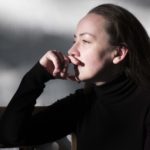 BRONKA (BRONISŁAWA) NOWICKA is a Polish theatre and TV director, screenwriter, poet, and interdisciplinary artist. She is a graduate of the National Film School in Łódź, Poland, and the Cracow Academy of Fine Arts. Her literary debut, Nakarmić kamień (To Feed the Stone) was awarded the 2016 Nike Literary Award and the Złoty Środek Poezji (Golden Mean of Poetry) award. In 2017, she was a laureate of the New Voices from Europe project.
BRONKA (BRONISŁAWA) NOWICKA is a Polish theatre and TV director, screenwriter, poet, and interdisciplinary artist. She is a graduate of the National Film School in Łódź, Poland, and the Cracow Academy of Fine Arts. Her literary debut, Nakarmić kamień (To Feed the Stone) was awarded the 2016 Nike Literary Award and the Złoty Środek Poezji (Golden Mean of Poetry) award. In 2017, she was a laureate of the New Voices from Europe project.
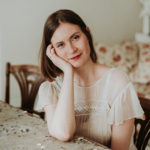
KATARZYNA SZUSTER is a translator. She earned her M.A. in English studies from the University of Łódź, Poland, and was a lecturer at the Department of Foreign Languages, University of Nizwa in Oman. She has translated various Polish poets into English, such as Miron Białoszewski, Justyna Bargielska, and Bronka Nowicka. Her translations have been published in Aufgabe, Free Over Blood, Moria, Biweekly, Words without Borders, diode, Toad Press, Berlin Quarterly, Seedings, Michigan Quarterly Review, and Tripwire.
Artwork by LULA BAJEK, Polish illustrator and drawer. She graduated from the Academy of Fine Arts in Krakow. Her accomplishments include the artistic project entitled The Black Sun. She spent two years in China learning traditional Chinese painting and now lives and works in Warsaw.


